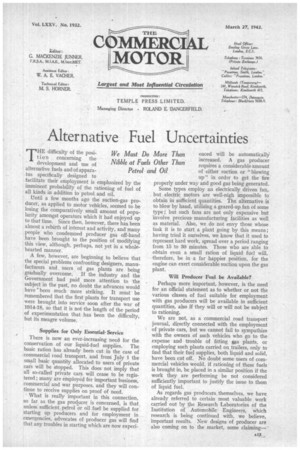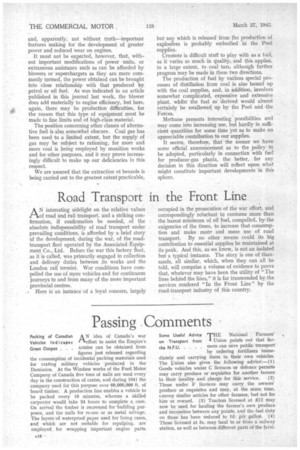Alternative Fuel Uncertainties
Page 17

Page 18

If you've noticed an error in this article please click here to report it so we can fix it.
THE difficulty of the position concerning the development and use of alternative fuels and of apparatus specifically designed to facilitate their employment is emphasized by the imminent probability of the rationing of fuel of all kinds in addition to petrol and oil.
Until a few months ago the suction-gas producer, as applied to motor vehicles, seemed to-be losing the comparatively small amount of popularity amongst operators which it had enjoyed up to that time. Since then, however, there has been almost a rebirth of interest and activity, and many people who condemned producer gas off-hand have been brought to the position of modifying this view, although, perhaps, not yet in a wholehearted manner.
A few, however, are beginning to believe that the special problems confronting designers, manufacturers and users of gas plants are being gradually overcome. If the industry and the Government had paid more attention to the subject in the past, no doubt the advances would have been much more striking. It must be remembered that the first plants for transport use were brought into service soon after the war of 1914-18, so that it is not the length of the period of experimentation that has been the difficulty, but its meagre volume.
Supplies for Only EssentialService
There is now an ever-increasing need for the conservation of our liquid-fuel supplies. The basic ration has already been cut in the case of commercial road transport, and from. July 1 the small basic quantity allocated to users of private cars will be stopped. This does not imply that all so-called private cars will cease to be registered; many are employed for important business, commercial and war purposes, and they will continue to receive supplies on proof of need.
What is really important in this connection, so far as the gas producer is concerned, is that unless sufficient petrol or oil fuel be supplied for starting up producers and for employment in emergencies, advocates of producer gas will find that any troubles in starting which are now experi enced will be automatically increased. A gas producer requires a considerable amount of either suction or "blowing up" in order to get the fire properly under way and good gas being generated. Some types employ an electrically driven fan, but electric motors are well-nigh impossible to obtain in sufficient quantities. The alternative is to blow by hand, utilizing a geared-up fan of some type ; but such fans are not only expensive but involve preciousmanufacturing facilities as well as material. Also, we do not envy those whose task it is to start a plant going by this means; having tried it ourselves, we know that it used to represent hard work, spread over a period ranging from 15 to 30 minutes. Those who are able to obtain even a small ration of liquid ftiel will, therefore, be in a far happier position, for the engine can exert considerable suction upon the gas plant.
Will Producer Fuel be Available? Perhaps more important, however, is the need for an official statement as to whether or not the various classes of fuel suitable for employment with gas producers will be available in sufficient quantities, also if they will or will not be subject to rationing. We are not, as a commercial road transport journal, directly connected with the employment of private cars, but we cannot fail to sympathize with the owners of such vehicles who go to the expense and trouble of fitting gas plants, or employing such plants carried on trailers, only to find that their fuel supplies, both liquid and solid, have been cut off. No doubt some users of commercial vehicles would, if rationing of these fuels is brought in, be placed in a similar position if the work they are performing be not considered sufficiently important to justify the issue to them of liquid fuel. As regards gas producers themselves, we have already referred to certain most valuable work carried out by the Research Laboratories of the Institution of Automobile Engineers, which research is being continued with, we believe, important results. New designs of producer are also coming on to the market, some claiming- and, apparently, not without truth—important features making for the development of greater power and reduced wear on engines.
It must not be expected, however, that, without important modifications of power units, or extraneous assistance such as can be afforded by blowers or superchargers as they are more commonly termed, the power obtained can be brought into close relationship with that produced by petrol or oil fuel. As was indicated in an article published in this journal last week, the blower does add materially to engine efficiency, but here, again, there may be production difficulties, for the reason that this type of equipment must be made to fine limits and of high-class material.
The position concerning other classes of alternative fuel is also somewhat obscure. Coal gas has been used to a limited extent, but the supply of gas may be subject to rationing, for more and more coal is being employed by munition works and for other purposes, and it may prove increasingly difficult to make up our deficiencies in this respect.
We are assured that the extraction ot benzole is being carried out to the greatest extent practicable, but any which is released from the production of explosives is probably embodied in the Pool• supplies.
Creosote is difficult stuff to play with as a fuel, as it varies so much in quality, and this applies, to a large extent, to coal tars, although further progress may be made in these two directions.
The production of fuel by various special processes of distillation from coal is also bound up with the coal supplies, and, in addition, involves somewhat complicated, expensive and extensive plant, whilst the fuel so derived would almost certainly be swallowed up by the Pool and the Forces.
Methane presents interesting possibilities and may come into increasing use, but hardly in sufficient quantities for some time yet as to make an appreciable contribution to our supplies.
It seems, therefore, that the sooner we have some official announcement as to the policy tq be adopted, particularly in connection with fuel for producer-gas plants, the better, for any decision in this direction will reflect upon what might constitute important developments in this sphere.




















































